| Srl | Item |
| 1 |
ID:
029364


|
|
|
|
|
| Publication |
Pluto Press, 1982.
|
| Description |
ix, 283p.pbk
|
| Standard Number |
0861043774
|
|
|
|
|
|
|
|
|
|
|
|
Copies: C:1/I:0,R:0,Q:0
Circulation
| Accession# | Call# | Current Location | Status | Policy | Location |
| 021928 | 972.84052/ARM 021928 | Main | On Shelf | General | |
|
|
|
|
| 2 |
ID:
121480
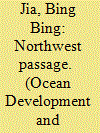

|
|
|
|
|
| Publication |
2013.
|
| Summary/Abstract |
This article uses the Northwest Passage as a case for study of one issue relating to the regime of international straits: whether a strait formed geographically and functionally by means of artificial aids for navigation may be regarded as an artificial waterway to which the regime of international straits does not apply. The article suggests that the Northwest Passage could be subject to a bilateral treaty regime between Canada and the United States, largely akin to that which applies to artificial waterways such as the Panama Canal. This solution would guarantee both Canadian sovereignty over the Passage and the interests of international shipping in having a route open and secure.
|
|
|
|
|
|
|
|
|
|
|
|
|
|
|
|
| 3 |
ID:
114620
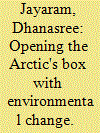

|
|
|
|
|
| Publication |
2012.
|
| Summary/Abstract |
This is posturing. This is the true north - strong and free, and they're
fooling themselves if they think dropping a flag on the ocean floor is going
to change anything. There is no question over Canadian sovereignty in
the Arctic. We've made that very clear. We've established - a long time
ago - that these are Canadian waters and this is Canadian property. You
can't go around the world these days dropping a flag somewhere. This
isn't the 14th or 15th century.
|
|
|
|
|
|
|
|
|
|
|
|
|
|
|
|
| 4 |
ID:
193531


|
|
|
|
|
| Summary/Abstract |
Our current global political system is being challenged, and one focal point of that struggle can be found in Central America. There, the Panama Canal has become a piece in a larger geopolitical game. For many years the canal has been of immense importance to international trade as well as to international security. While the United States was once the guarantor of its security, China has now established a large presence in the region. This has been accomplished by using corporations as fronts for a civilian-led take-over of ports and harbors in the Canal Zone. China’s current posture has ramifications for the security in and around the Canal, to the effect that China now has a strategic choke-hold on the US in the region.
|
|
|
|
|
|
|
|
|
|
|
|
|
|
|
|
| 5 |
ID:
115466


|
|
|
| 6 |
ID:
132024
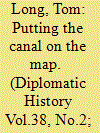

|
|
|
|
|
| Publication |
2014.
|
| Summary/Abstract |
In the early 1970s, Panama's negotiations with the United States over the status of the Panama Canal ground to a standstill. General Omar Torrijos had rejected treaties left unratified by previous governments only to receive a less generous offer from the Nixon administration. Realizing that the talks were being ignored in Washington, the Panamanian government worked to internationalize the previously bilateral issue, creating and exploiting a high-profile forum: Extraordinary meetings of the UN Security Council in March 1973 held in Panama City. In those meetings, Panama isolated the United States in order to raise the issue's profile and amplify the costs of leaving the matter unsettled. Using underutilized Panamanian sources, this article examines that meeting, the succeeding progress, and the effect of this early stage on the final negotiations several years later. The case also illustrates how, during the unsettled international environment of the 1970s, a small state utilized international organizations to obtain attention and support for its most important cause.
|
|
|
|
|
|
|
|
|
|
|
|
|
|
|
|
| 7 |
ID:
106827


|
|
|
|
|
| Publication |
2011.
|
| Summary/Abstract |
Historians have long recognized that the 1977-8 debate surrounding the Panama Canal treaties constituted a formative moment in the history of the New Right. By closely analyzing the arguments both for and against the treaties, Natasha Zaretsky contends that the debate crystallized a broader struggle between two articulations of U.S. nationalism after Vietnam. Supporters believed that the treaties signaled the development of a post-Cold War, post-Vietnam framework for U.S. foreign policy, one that would reinsert moral considerations into the realm of policymaking. Meanwhile, opponents believed that what they called the "giveaway" of the Canal was symptomatic of a larger pattern of American retreat in the wake of military defeat in Vietnam. The essay traces the contours of the debate among members of the Carter Administration, Congress, grassroots organizers, and ordinary men and women.
|
|
|
|
|
|
|
|
|
|
|
|
|
|
|
|
| 8 |
ID:
133593
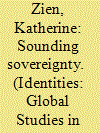

|
|
|
|
|
| Publication |
2014.
|
| Summary/Abstract |
The Panama Canal's handover from US governance to Panamanian sovereignty concluded on 31 December 1999. 'Patria Entera' (loosely translated as 'Whole Homeland'), a state-sponsored open-air concert, commemorated the handover and promulgated new readings of the Panama Canal Zone's decolonisation process. Concert headliner Rubén Blades deployed repertory and symbolic strategies to counterbalance Panamanians' ambivalence regarding the handover. 'Patria Entera' recast the Panama Canal Zone as an accessible space and narrated the handover as the Panamanian citizenry's collective inheritance of the Canal and accompanying Zone. Yet the concert's discursive arc overlooked persistent and emerging challenges.
|
|
|
|
|
|
|
|
|
|
|
|
|
|
|
|
| 9 |
ID:
135567
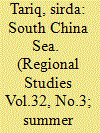

|
|
|
|
|
| Summary/Abstract |
The South China Sea is now a principal node of global power politics, critical to the preservation of the world wide balance of power. While control of it may not quite unlock the world for china as control of the greater Caribbean unlocked the world of America; the Caribbean, even with the Panama Canal, has never lain astride the great maritime routes and energy to the degree that the South China Sea presently does.
|
|
|
|
|
|
|
|
|
|
|
|
|
|
|
|
| 10 |
ID:
097874


|
|
|
|
|
| Publication |
2010.
|
| Summary/Abstract |
For the history connecting East Asia with the West, there is much literature about contact and trade across the Atlantic Ocean from the sixteenth to the early nineteenth centuries. This paper notes the rapid growth of the Pacific Ocean in linking Asia with the larger world in the early twentieth century by perceiving the economic relationships between Taiwan and Hong Kong while Japan colonized Taiwan. The Pacific route from Taiwan directly to America or through Japan largely replaced the Hong Kong-Atlantic-Europe-USA route to move Taiwan's export products to countries in the West. Other than still using Hong Kong as a trans-shipping point to connect with the world, Japan utilized Taiwan as a trans-shipping point to sell Japanese products to South China, and Taiwan's tea was sold directly to Southeast Asia rather than going through Hong Kong. Taiwan's exports to Japan took the place of its exports to China. Japanese and American goods dominated over European goods or Chinese goods from Hong Kong for Taiwan's import. Japanese and Taiwanese merchants (including some anti-Japanese merchants) overrode the British and Chinese merchants in Hong Kong to carry on the Taiwan-Hong Kong trade. America's westward expansion towards the Pacific, the rise of the Pacific shipping marked by the opening of the Panama Canal in 1914, and the rise of Japan relative to China, restructured intra-Asian relations and those between Asia and the rest of the world.
|
|
|
|
|
|
|
|
|
|
|
|
|
|
|
|
| 11 |
ID:
018050


|
|
|
|
|
| Publication |
July-Aug 2000.
|
| Description |
22-31
|
|
|
|
|
|
|
|
|
|
|
|
|
|
|
|